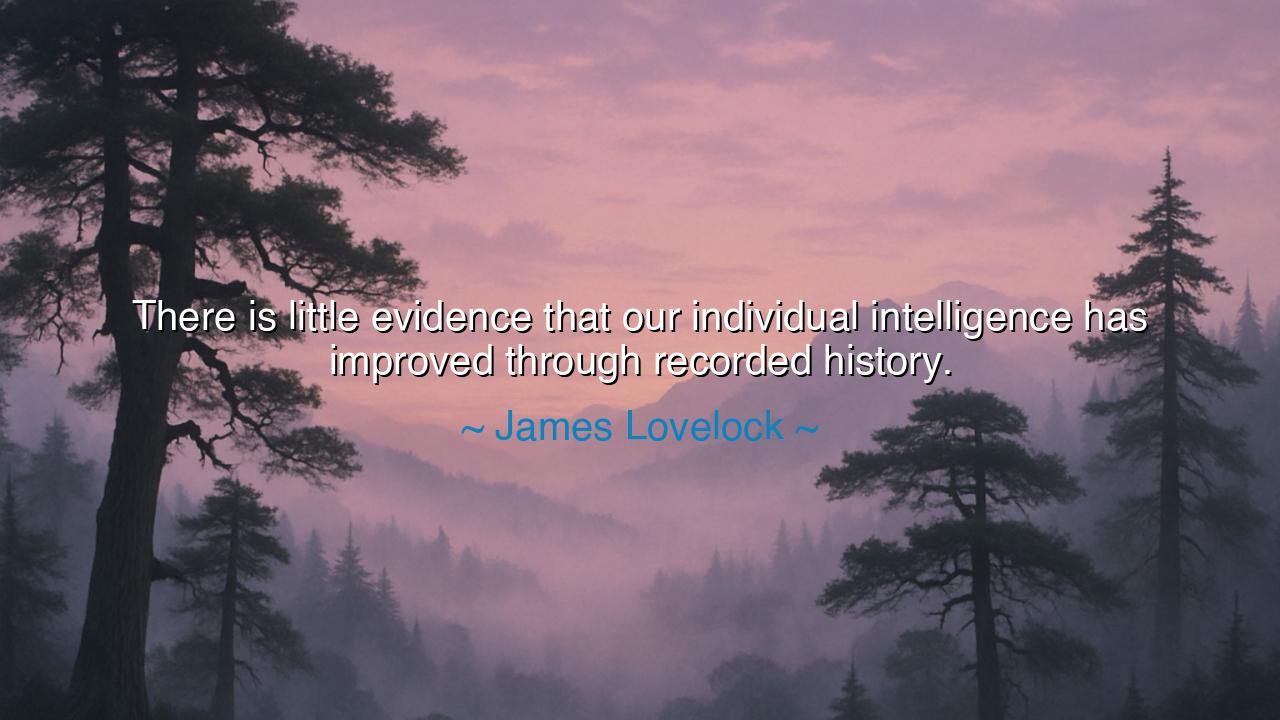
There is little evidence that our individual intelligence has
There is little evidence that our individual intelligence has improved through recorded history.






“There is little evidence that our individual intelligence has improved through recorded history.” Thus spoke James Lovelock, the great scientist, philosopher, and seer of the Earth, whose mind beheld the vastness of the living planet and called it Gaia. His words strike like a chime in the stillness — haunting, humbling, and true. In this saying lies a paradox of the ages: though we, as a species, have built empires, machines, and miracles of thought, our individual wisdom — the clarity of the human soul — remains much as it was when our ancestors first gazed at the stars. Lovelock’s reflection reminds us that progress in knowledge is not the same as progress in understanding, and that intelligence, though sharpened by time, has not grown deeper in spirit.
For what is intelligence, if not the ability to see, to reason, and to act rightly? In this measure, the man of today is not greater than the man of Greece, of Egypt, or of ancient China. The builders of pyramids, the philosophers of Athens, the poets of the Vedas — they possessed no computers, no satellites, no telescopes that could pierce the heavens. Yet their minds conceived truths of equal grandeur to those of any modern genius. Lovelock reminds us that while our collective power has expanded, our individual insight remains constant, perhaps even dimmed by the very tools we have created. For intelligence alone does not breed wisdom; indeed, it may blind us when it serves pride rather than truth.
Consider Socrates, the wise man of Athens, who walked barefoot among the people and claimed to know only that he knew nothing. In his humility, he was greater than many who came after, for he understood that the measure of intelligence is not the accumulation of facts, but the recognition of one’s own ignorance. Centuries have passed, and our libraries overflow, our networks hum with infinite information — yet how few possess Socratic wisdom! The instruments have multiplied, but the soul of discernment has not deepened. Lovelock’s lament is this: that humanity has learned to reach outward into the cosmos but has forgotten to look inward into the heart.
In the realm of science, too, his words carry weight. Lovelock, who beheld the fragility of the Earth, saw that our brilliance has outpaced our restraint. We can split the atom but not temper our anger; we can reshape the climate but not our desires. The ancients, with lesser means, lived closer to nature’s rhythm, guided by necessity and reverence. The modern mind, intoxicated by mastery, mistakes knowledge for virtue. Thus, though our technologies glitter, our intelligence as moral beings — the wisdom to live well and wisely — has scarcely changed. We have extended the reach of the mind, but not the maturity of the spirit.
And yet, in Lovelock’s observation there lies not despair, but warning — and hope. If intelligence has not grown, then it may yet grow; if the flame of wisdom burns low, it can be kindled again. For though the human brain has not evolved, the human heart remains capable of awakening. The key, Lovelock suggests, is not invention but reflection — not faster thought, but deeper thought. We must learn again to think as the sages thought: slowly, courageously, with reverence for the whole. Intelligence without humility is like fire without direction — bright, but dangerous.
Look to the story of Oppenheimer, father of the atomic bomb. He was a man of immense intellect, who brought forth the power of the sun itself. Yet when he saw what his creation had wrought, he recalled the words of the Bhagavad Gita: “Now I am become Death, the destroyer of worlds.” In that moment, he realized what Lovelock warns — that intellect without wisdom is destruction disguised as progress. The ancients, though less learned in science, were perhaps more learned in the art of being human. Their temples were aligned not to greed, but to the heavens; their wisdom was measured not by power, but by balance.
Therefore, O seeker of truth, take this teaching as your compass: do not confuse knowledge with wisdom, nor cleverness with understanding. Learn deeply, but live humbly. Build machines, but do not let them build your mind. Let your intelligence serve love, justice, and harmony, for these are the true marks of evolution. When Lovelock says that human intelligence has not improved, he does not condemn us — he challenges us. He calls us to awaken the sleeping faculty of wisdom within, to unite heart and mind once more.
For if humanity is to endure — if our knowledge is to illuminate rather than destroy — we must remember what our ancestors knew in silence: that the greatest intelligence is not to conquer the world, but to live in harmony with it. So, let each person begin anew the ancient journey — to think clearly, to feel deeply, and to act rightly — until our intelligence grows not in cunning, but in compassion, and we may finally be worthy of the wisdom that the ages have been waiting for.






AAdministratorAdministrator
Welcome, honored guests. Please leave a comment, we will respond soon